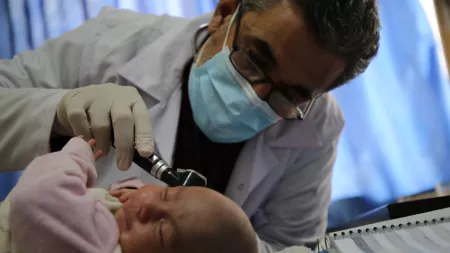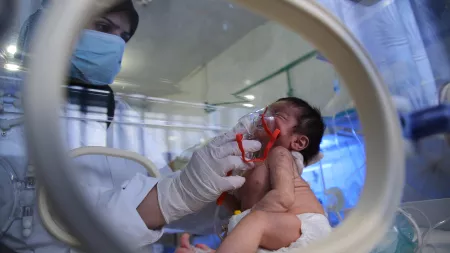The devastating earthquakes that hit south-central Türkiye and parts of northern Syria on February 6 caused wide-scale damage to water networks, sewage systems and basic hygiene infrastructure across both sides of the border, limiting people’s access to clean water, sanitation, and hygiene. As a result, men, women and children are now met with more long-term health concerns and risks, with warning signs of a potential outbreak of waterborne diseases in the wider region.
In Türkiye, approximately 2.3 million people are now living in settlements, out of which 1.6 million are residing in informal settlements or in rural areas in close proximity to their destroyed homes. The issue of water shortages and lack of adequate toilet and shower facilities in many locations are prevalent across many locations and pose significant risks especially for women, who carry the responsibility of caring for their families, cooking and washing their children and caring for the elderly.
Women report to our staff that their biggest concern is having access to clean water and safe sanitation facilities. They often lack privacy and do not feel secure simply go to the toilet.says Sherine Ibrahim, CARE Türkiye Country Director
Hatay is one of the provinces that were the most hard-hit by the earthquakes. People depend on humanitarian aid distributions to secure drinking water.
“In such harsh and poor sanitation conditions resulting from the earthquakes, we are starting to see a growing number of diarrhea cases, as well as scabies and lice infestations. With unhygienic, cramped living conditions, the threat of a disease outbreak is very real,” Sherine Ibrahim continues.
CARE's response
To respond to the increasing needs and help prevent a potential disease outbreak, CARE is focusing its response on informal settlements and people living in the most severely affected provinces of south-central Türkiye, such as Hatay and Iskenderun, by providing safe and clean water, mobile latrines and hygiene kits, which include items such as soap and towels. Since the earthquakes, CARE has reached more than 30,000 individuals through its water, sanitation and hygiene related activities, which include distributions of drinking water, hygiene kits, and portable toilets. In total, CARE has distributed more than 174,000 kits.
In northwest Syria, where at least 148 communities have been affected by the earthquakes and more than 100,000 people have been displaced; the pre-earthquake cholera outbreak remains a severe public health threat, exacerbated now by the extensive damage to water, sanitation, and hygiene infrastructure, while the already burdened healthcare system is now pushed to its limits.
Currently, there are more than 60,000 suspected cholera cases in northwest Syria and the number is expected to rise as a result of the immense unmet water, sanitation, and hygiene gaps.says Sherine Ibrahim.
Ibrahim continues, "Around 64% of the affected people in northwest Syria need clean water, safe sanitation facilities and hygiene items. Water shortages and destroyed or nonexistent water networks and sewage management systems are increasingly putting at risk especially children who are already suffering from malnutrition, pregnant and breastfeeding women and those in displacement or temporary camps".
CARE supports the affected population in northwest Syria by providing water trucking that helps secure 30 to 35 liters per person daily for communities with no access to safe and adequate water supplies. CARE also supports the operation of existing water stations and restoration of piped water networks, focusing on camps and communities hosting large numbers of displaced people.
We have reached more than 190,000 individuals through water, sanitation and hygiene activities and we have distributed more than 174,323 hygiene and dignity kits, while we continue to scale up our support to healthcare centers and health promotion and awareness programs being implemented with partners.
“Health needs continue to be pressing amidst the ongoing cholera outbreak, which is extremely concerning given that nearly 70 facilities were damaged or destroyed by the earthquakes, as of 22 March. The situation is particularly dire for people suffering from complex medical conditions and chronic illness and the mental toll is also quite concerning. According to the UN, over 1 million people in northwest Syria are in need of mental support but there are reportedly only 24 psychologists in the area”, Sherine Ibrahim continues.
To respond to the health needs in northwest Syria, we support one pediatric and maternity hospital in A’zaz, Aleppo and three Basic Emergency Obstetric and Newborn Care centers in Aleppo and in Idlib, three sexual and reproductive clinics in Aleppo and Idlib that offer obstetrics care, pediatric care, post-natal care, family planning, ante natal care, sexual and reproductive health services. We also have four mobile medical units and outreach teams who provide general health consultations, nutrition services, distribute hygiene items such as soap, and provide health and hygiene messages to prevent the spread of cholera.

On World Health Day, CARE underlines the urgent water and sanitation needs of people in the earthquake affected areas in both Türkiye and northwest Syria and calls on the international community to not lose sight of the medium and long-term health needs of the earthquake-affected communities. If these needs remain unmet, the threat of severe health risks is very real. Despite our collective efforts, over a decade into the conflict in Syria, and two months after the devastating earthquakes; it is of utmost importance that the humanitarian response is scaled up to meet the growing needs.
For media inquiries, please contact Dora Vangi, Communications Consultant, Turkiye and Syria Earthquake Response via: [email protected]
